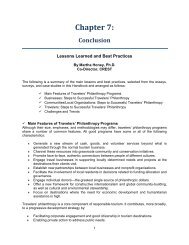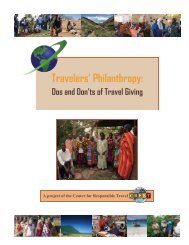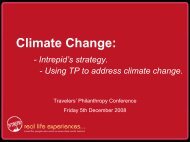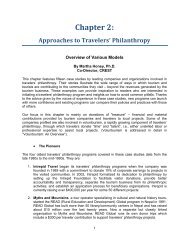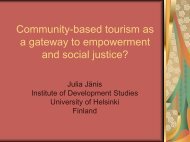Travelers' Philanthropy Handbook - Center for Responsible Travel
Travelers' Philanthropy Handbook - Center for Responsible Travel
Travelers' Philanthropy Handbook - Center for Responsible Travel
You also want an ePaper? Increase the reach of your titles
YUMPU automatically turns print PDFs into web optimized ePapers that Google loves.
Implicitly, however, I want something else. I want to be thanked. I’d like to hear a villager say,in a video clip, “Thank you, David, <strong>for</strong> making our lives better.” This all seems very reasonable.But might something happen to lead local people to say instead, “I don’t want to say thank you,”or if they go in front of the camera, to say thanks grudgingly?Yes, something like that might happen. Note that my brief visit to the village can make thevillagers realize, or sense more intently than be<strong>for</strong>e, that whatever inequality there is within thevillage is dwarfed by the inequality in the world outside the village. “Any one of those visitorshad an income equal to our whole village. We didn’t think of ourselves be<strong>for</strong>e they came asbeing poor. But now we do, because their visit <strong>for</strong>ces us to compare ourselves to them.Realizing that we are poor makes us envious, jealous, unhappy.”One way to express that unhappiness is against its apparent source, the rich donor. Let me layout an entirely reasonable and understandable mental scenario on the part of a villager. “Herethey are, the richest people in the world coming to see us, perhaps because they enjoy showingoff their wealth among people like us who are miserably poor. Besides, did they deserve allthat wealth? I didn’t see any evidence that they are better than we are, morally. Instead,some of them got drunk and were rude to the waiters. In addition, there’s no connectionbetween wealth and work. We didn’t see them working the entire time they were here. In fact,they spent the whole day partying, acting like life was one big vacation. It was we who did thework, not only on our farms but also in the lodge, cleaning their rooms, preparing their food, andserving it to them. The inequality we observe is not only enormous; it’s also unfair andunjustified. I don’t like the tourists, because they have things they don’t deserve.”Added to this perception is the problem of dependence. Charity generates dependence. Ifmoney comes from the outside, it almost invariably makes the recipient dependent on thedonor. The recipient is getting something, but not <strong>for</strong> free: the gift comes with strings, conditions,that the money be used <strong>for</strong> a particular purpose. The recipient is expected to meet thoseconditions.Moreover, up to this point the village may have been relatively self-reliant, producing much ofthe food, clothing, and household goods it consumes and consuming much of what it produces.This is a result less of conscious choice than of geography and level of development. Thevillage may be physically isolated from other villages, with no road through it and no bridgeacross the river and no buses or trucks to transport people and the commodities they producefrom home to a market several miles away. The very act of the tourist coming in, as a follow-upto the bulldozers, roads, contractors, imported carpenters and plumbers building the lodgeswhere the tourists stay, links villages to the outside world and permanently destroys their selfreliance.This change creates the setting <strong>for</strong> dependency to flourish. In the worst case, itturns dependency into a welfare handout. Villagers can come to see the tourist donation not asa one-time transaction but as Round 1 in a series of gifts expected in the future. After all, thetourist clearly has a lot more money than the amount he is giving, as well as access to otherswith money. It becomes easy, based on one act of unexpected generosity, <strong>for</strong> recipients tocome to expect others like it; and to become upset at the donor if future gifts aren’t <strong>for</strong>thcoming.Here again we have an understandable misunderstanding. It is not because villagers are badpeople that they think like this. It’s because they are human beings like us. They are rationalcreatures, making rough predictions about the future based on what they observe to behappening in the present.184




